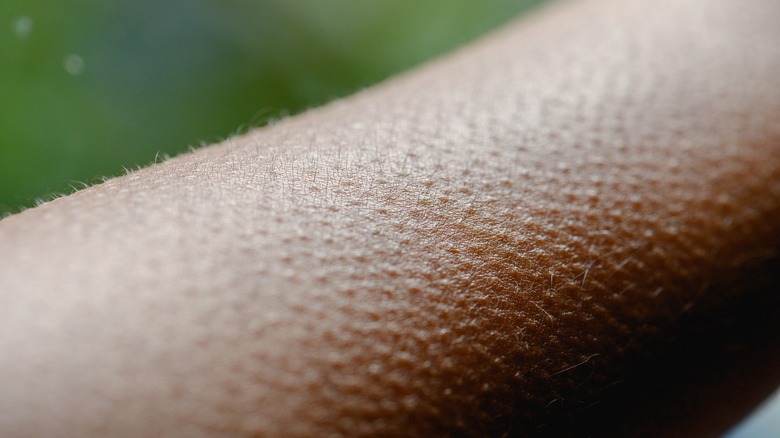Why Some Music Gives You Chills, According To Science
Music is a form of performance, ritual, and entertainment that is found in all cultures of the world. While music is highly diverse in the way it is practiced and consumed, it is universal in many of the systems it employs — such as rhythm — and the human responses it elicits, such as dancing and singing.
Today, music is a multi-billion dollar industry. Artists working in the medium, such as Taylor Swift and Beyonce, are some of the wealthiest and most instantly recognizable people on the planet, though styles of popular music change quickly like fashion does. But rather than being something we learn how to consume, our love of music appears to be innate.
Babies and toddlers, for example, can dance to artists such as Swift as naturally as they tend to fall asleep to traditional lullabies. We typically retain our ability to be affected by music as we enter adulthood, with studies showing that the majority of people have experienced a musical "frisson," otherwise known the "the chills," when listening to music. While scientists are still trying to explain exactly why certain passages of music may affect listeners in such a way, research has shown that the shiver down your spine you feel is underpinned by a series of complex physical responses in the nervous system.
A physiological response
Music as an aesthetic experience is in many ways a pleasure of the intellect: those with musical training may appreciate the ingenious composition of particular pieces, while we can also gain pleasure from evocative and memorable lyrics, hooks, and melodies. But as the sometimes irresistible urge to tap one's foot unconsciously to the beat proves, music also has automatic physical effects on the body, one of which is chills. Scientists now believe that chills may have been experienced by our most distant ancestors, and are ultimately linked to adrenaline.
Dr. Sanam Hafeez, NYC Neuropsychologist and Director of Comprehend the Mind, told Grunge in an email interview: "Chills elicit a complex physiological response involving the autonomic nervous system, the hypothalamus, muscle contractions, piloerection, immune system activation, changes in breathing patterns, and the release of endorphins. These responses work together to regulate body temperature, generate heat, and potentially create a unique subjective experience for the individual."
Hafeeze explained further, "Firstly, the body's autonomic nervous system reacts by activating the sympathetic branch, which is responsible for the 'fight or flight' response. This triggers the release of adrenaline, causing blood vessels to constrict and increasing heart rate and blood pressure. When chills occur, the hypothalamus detects a drop in body temperature and initiates a series of responses to generate heat." This heat comes from the muscles contracting, which is the reason for the shiver or "chill" one feels when affected by a particular piece of music.
Individual emotional responses
But getting chills from music isn't universal. We don't all feel a shiver when we listen to the same pieces of music, and some people have never experienced chills as a result of what they hear. There are physiological reasons why some listeners may be more susceptible to having physical reactions to the music they hear than others. "Some people may be less prone to experiencing chills from music due to differences in their autonomic nervous system responses," says Dr. Sanam Hafeez. "The autonomic nervous system regulates involuntary bodily functions, including the response to stimuli like music. Individuals with less sensitive autonomic responses may be less likely to experience chills."
Unsurprisingly, recent research suggests that such responses are highly personal. In 2015, a study published in the journal Psychology of Music exploring music frisson, or "pleasurable aesthetic chills" derived from music, noted that personality types may also be a factor in how often chills are experienced, if at all. Its authors, Mitchell C. Colver and Amani El-Alayli, posit that openness in individuals as they listen to music plays a vital role in whether they experience chills, which may be linked to their familiarity with the song and its resonances; i.e., if a person has particular pieces of music that evoke strong memories or feelings.
"Emotional sensitivity and personal experiences play significant roles in eliciting chills," agrees Dr. Hafeez. "Music often evokes strong emotional responses, and individuals who are more emotionally responsive or have a deep personal connection to the music they're listening to are more likely to experience chills."


